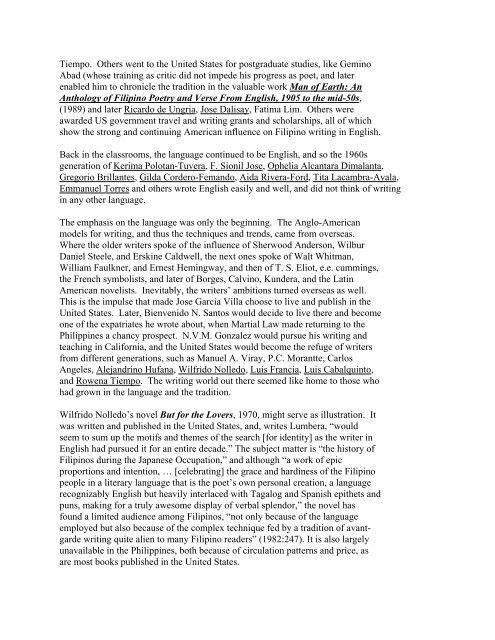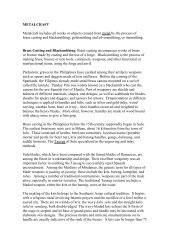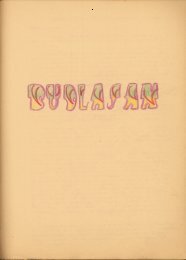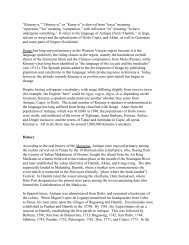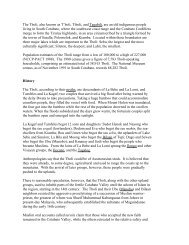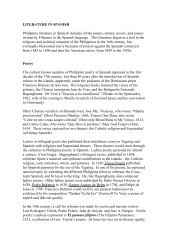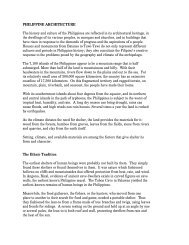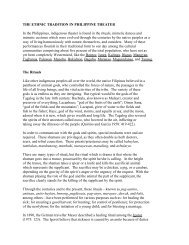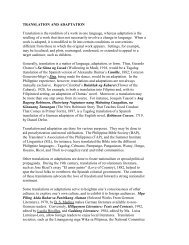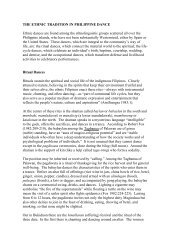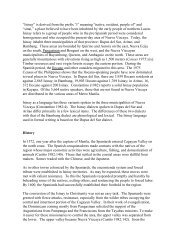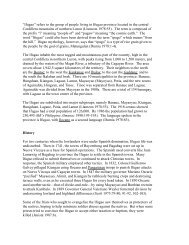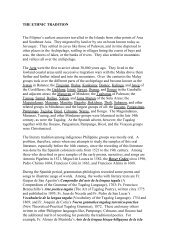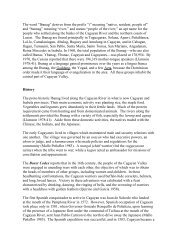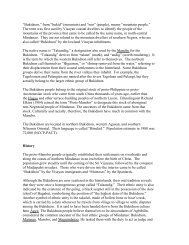LITERATURE IN ENGLISH Philippine literature in English is ...
LITERATURE IN ENGLISH Philippine literature in English is ...
LITERATURE IN ENGLISH Philippine literature in English is ...
Create successful ePaper yourself
Turn your PDF publications into a flip-book with our unique Google optimized e-Paper software.
Tiempo. Others went to the United States for postgraduate studies, like Gem<strong>in</strong>o<br />
Abad (whose tra<strong>in</strong><strong>in</strong>g as critic did not impede h<strong>is</strong> progress as poet, and later<br />
enabled him to chronicle the tradition <strong>in</strong> the valuable work Man of Earth: An<br />
Anthology of Filip<strong>in</strong>o Poetry and Verse From <strong>Engl<strong>is</strong>h</strong>, 1905 to the mid-50s,<br />
(1989) and later Ricardo de Ungria, Jose Dal<strong>is</strong>ay, Fatima Lim. Others were<br />
awarded US government travel and writ<strong>in</strong>g grants and scholarships, all of which<br />
show the strong and cont<strong>in</strong>u<strong>in</strong>g American <strong>in</strong>fluence on Filip<strong>in</strong>o writ<strong>in</strong>g <strong>in</strong> <strong>Engl<strong>is</strong>h</strong>.<br />
Back <strong>in</strong> the classrooms, the language cont<strong>in</strong>ued to be <strong>Engl<strong>is</strong>h</strong>, and so the 1960s<br />
generation of Kerima Polotan-Tuvera, F. Sionil Jose, Ophelia Alcantara Dimalanta,<br />
Gregorio Brillantes, Gilda Cordero-Femando, Aida Rivera-Ford, Tita Lacambra-Ayala,<br />
Emmanuel Torres and others wrote <strong>Engl<strong>is</strong>h</strong> easily and well, and did not th<strong>in</strong>k of writ<strong>in</strong>g<br />
<strong>in</strong> any other language.<br />
The emphas<strong>is</strong> on the language was only the beg<strong>in</strong>n<strong>in</strong>g. The Anglo-American<br />
models for writ<strong>in</strong>g, and thus the techniques and trends, came from overseas.<br />
Where the older writers spoke of the <strong>in</strong>fluence of Sherwood Anderson, Wilbur<br />
Daniel Steele, and Ersk<strong>in</strong>e Caldwell, the next ones spoke of Walt Whitman,<br />
William Faulkner, and Ernest Hem<strong>in</strong>gway, and then of T. S. Eliot, e.e. cumm<strong>in</strong>gs,<br />
the French symbol<strong>is</strong>ts, and later of Borges, Calv<strong>in</strong>o, Kundera, and the Lat<strong>in</strong><br />
American novel<strong>is</strong>ts. Inevitably, the writers’ ambitions turned overseas as well.<br />
Th<strong>is</strong> <strong>is</strong> the impulse that made Jose Garcia Villa choose to live and publ<strong>is</strong>h <strong>in</strong> the<br />
United States. Later, Bienvenido N. Santos would decide to live there and become<br />
one of the expatriates he wrote about, when Martial Law made return<strong>in</strong>g to the<br />
<strong>Philipp<strong>in</strong>e</strong>s a chancy prospect. N.V.M. Gonzalez would pursue h<strong>is</strong> writ<strong>in</strong>g and<br />
teach<strong>in</strong>g <strong>in</strong> California, and the United States would become the refuge of writers<br />
from different generations, such as Manuel A. Viray, P.C. Morantte, Carlos<br />
Angeles, Alejandr<strong>in</strong>o Hufana, Wilfrido Nolledo, Lu<strong>is</strong> Francia, Lu<strong>is</strong> Cabalqu<strong>in</strong>to,<br />
and Rowena Tiempo. The writ<strong>in</strong>g world out there seemed like home to those who<br />
had grown <strong>in</strong> the language and the tradition.<br />
Wilfrido Nolledo’s novel But for the Lovers, 1970, might serve as illustration. It<br />
was written and publ<strong>is</strong>hed <strong>in</strong> the United States, and, writes Lumbera, “would<br />
seem to sum up the motifs and themes of the search [for identity] as the writer <strong>in</strong><br />
<strong>Engl<strong>is</strong>h</strong> had pursued it for an entire decade.” The subject matter <strong>is</strong> “the h<strong>is</strong>tory of<br />
Filip<strong>in</strong>os dur<strong>in</strong>g the Japanese Occupation,” and although “a work of epic<br />
proportions and <strong>in</strong>tention, … [celebrat<strong>in</strong>g] the grace and hard<strong>in</strong>ess of the Filip<strong>in</strong>o<br />
people <strong>in</strong> a literary language that <strong>is</strong> the poet’s own personal creation, a language<br />
recognizably <strong>Engl<strong>is</strong>h</strong> but heavily <strong>in</strong>terlaced with Tagalog and Span<strong>is</strong>h epithets and<br />
puns, mak<strong>in</strong>g for a truly awesome d<strong>is</strong>play of verbal splendor,” the novel has<br />
found a limited audience among Filip<strong>in</strong>os, “not only because of the language<br />
employed but also because of the complex technique fed by a tradition of avantgarde<br />
writ<strong>in</strong>g quite alien to many Filip<strong>in</strong>o readers” (1982:247). It <strong>is</strong> also largely<br />
unavailable <strong>in</strong> the <strong>Philipp<strong>in</strong>e</strong>s, both because of circulation patterns and price, as<br />
are most books publ<strong>is</strong>hed <strong>in</strong> the United States.


